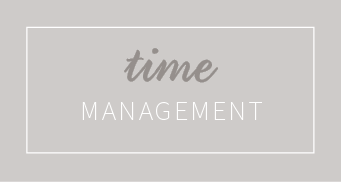Reclaim 5 hours of Your Week Every Week!

Are you sick and tired of
- EMAIL running your life?
- Working on weekends?
- Getting sucked into minutia?
- Your office being jammed full of paper?
- The chaos in your office?
- Always being behind schedule?
- Constantly struggling to get everything done?
There’s an easier way! Transform your business and your life with customized, sustainable systems so you can put an extra 5 hours into your calendar and put thousands of dollars back into your business.
My team and I support you in creating structures that will transform your life by changing your relationship with your possessions, and creating customized sustainable solutions. The results are a significant reduction in stress and an increase in your quality of life.
What could you ACCOMPLISH with an extra hour a day?
If you don’t even know where to start,
contact Virginia today for your free, no obligation consultation!

RECENT BLOG POSTS
Take a break and be more productive!

Believe it or not but taking a break can really increase your productivity. Our focus improves after we’ve given ourselves a little down time.
What makes the best kind of break?
Don’t think about work
Your brain is running a mile a minute pretty much all day. Relax and let your mind wander.
Leave technology behind
We spend so much time on our computers and phones, it’s good to give our eyes a break.
Include physical activity
Most of us sit at our desks, hunched over typing away all day. My friend and top-notch pilates instructor, Cassidy Moore, created a video to show you three very simple stretches you can do every day to feel better in your body. All you need to do is follow the link to watch the video. I hope you find it helpful!
Follow these strategies to be more productive and feel better throughout the day!
Why are you checking your email now?

A long time ago back, my assistant accidentally scheduled an email to go out at 10:15 PM (instead of 10:15 AM) and I was shocked to see how many people opened it.
I know that when most of my clients come to me they are working nights and weekends and checking email from the time they first wake up to just before bed. But, it was still disheartening to see so many people checking email on a Saturday night.
You likely know why it’s important to not check email so often. So, how can you break the email addiction? (Yes, it’s become a full fledged addiction for a lot of people).
Here are some good places to get started:
Remind yourself that you get more done when you have breaks between working. If you’re working all the time and never give your brain a chance to rest and recharge, the work that you do won’t be as good and it will take you longer to complete.
Set an alarm to remind you to turn off your phone. I fully understand the irony of using technology to break a tech habit, but it can be a useful tool (especially if you don’t have million other alerts and alarms going off.
Take baby steps. If not checking your email up until the time you go to bed makes you hyperventilate, try having the last time you check if for the day be 5 minutes before going to bed. And, spend that last 5 minutes email free. Many people will find that they can go that long without checking it. After you comfortably go that long, you can always gradually increase your email-free time.
If you’re ready to take back control of your time and break the email addiction and want more support, email me and I’d be happy to help.
Can you follow your systems without thinking?

Have you ever driven home, arrived home, and then realized you weren’t even paying attention as you were driving? That experience is called unconscious competence (one of the four stages of competence) and it can be pretty unsettling in that example, but it’s what you should strive for when you’re creating systems.
Imagine moving through your day and using all your systems and not having to think about it. Sounds pretty great, right?
Here’s how you get there:
Unconsciously Incompetent
The starting point for most things is unconscious incompetence. (There are some people who are naturally good at something like singing or someone who has an effortless green thumb.) But for most of us, when it comes to creating systems, we are unconsciously incompetent. In this stage, you don’t know that you’re not good at something. You remain in this stage until you become…
Consciously Incompetent
You’re suddenly aware that you’re not good at something. If it’s a skill that you think you need, this is where the stress and overwhelm come in. You begin to notice that other people are competent at the skill you’d like to acquire. You start to learn more and work toward being…
Consciously Competent
You’re there! You’ve made it (or so it seems). You’ve worked hard toward being more skilled. It’s exciting and things are flowing more easily, but it’s still time consuming. Being competent zaps your mental energy and takes up more of your day. At this point, there are 2 options. Remain here and continue to exert more effort than you need to or transition to being…
Unconsciously Competent
The secret about unconscious competence is that it doesn’t necessarily take extra effort. It takes consistency. With every other preceding step, it takes thought, determination, and effort. But, if the systems you create are ones that in line with the way that you operate, then you’ll end up unconsciously competently following your systems.
If you continue to exert extra effort, it means that you’re still stuck in the conscious competent stage and the system likely needs adjusting.
Take a look at some of the systems you have and see where they fit in the Conscious Competence Learning Model. From there, you’ll have a better understanding of what systems need to be adjusted.
Warning! Stop abandoning your systems!!!

Systems only work when you use them.
Of course if you spent time and energy to set up a system that’s working really well for you, you’d keep using it. Right?
You’d think that would be the case, but here are some common reasons why people stop using great systems:
It gets really busy. You’ve been there. You’re stretched. You’re working a ton. You’re working so much that you just skip doing something that takes an extra few seconds or minutes because it seems like you could use every extra second.
Example: You might have experienced this with files. Have you ever put a piece of paper on your desk instead of in the file? Or, have you ever left a new document on your computer desktop because you didn’t take the extra few seconds to find the right folder?
It seems like you don’t need the system anymore. Everything is working amazingly well. You’re on top of it all. You don’t feel stressed out. You’re not overwhelmed. You feel like you’ve “made it” so you stop using the system.
Example: Think of it this way…You decide to go to the gym so you can be at a certain level of fitness. Once you get to that level, you don’t stop going to the gym. You need to keep going to maintain the level of fitness you achieved. It’s the same with systems. You might have an initial push of extra effort in the beginning, but you need to keep using your systems to realize the benefit.
A new team member doesn’t use it. Maybe you just brought on a new hire or VA who joins the company and doesn’t use the system you set up. It might be because they haven’t been properly trained. Or, maybe they don’t see the point in following that particular system so they just don’t do it.
Example: You might have experienced this if you’ve ever had a team member leave and you’re left a little lost and confused about how they organized things.
It can be so easy so stop using systems when something like the examples above sneak up on you.
If you’re finding that you keep abandoning systems (for any reason—not just the reasons above), schedule a time to chat. We’ll set things up so they work for you for the long-term.
A fool-proof way to get motivated

Waiting to tackle that project until you’re in the mood?
If you’ve had something on the backburner for a while and you’re waiting for a little motivation, you’re going to be waiting for a long time.
There’s a misconception that we’ll get around to doing something as soon as we feel motivated.
But what really happens is that we find our motivation after we’ve started. I bet you’ve already experienced this yourself.
Have you ever started something that you’ve been meaning to for a while and felt relieved to be working on it, excited to finish, or motivated to keep working longer than you thought?
Well, there’s your motivation!
So, if you’d like to tackle something that you’ve been putting off, you’re much better off if you commit to starting, then make time to work on it, and you’ll likely find your motivation after you start. (It’s best to give yourself at least 20 minutes…Motivation usually doesn’t kick in right away.)
If you’re motivated to do some of the things that have been on your back burner, but still need some support, let me know. I’d be happy to chat.
Too many emails in your inbox?

You might be surprised to hear me say this, but it actually doesn’t matter how many emails are in your inbox.
Inbox zero (not sure what this is? See the P.S. below) was coined a few years ago, but it seems that there’s been a resurgence because people have been asking me about it a lot more lately.
Do you think inbox zero is the holy grail of effective email management?
Think again!
Ask yourself these questions to find out if you need to work toward inbox zero (or a different kind of email system):
- Are you overwhelmed by your email inbox?
- Do emails fall through the cracks?
- Can you find emails when you need them?
- Can you find those emails quickly?
If you answered “no” to the first two questions and “yes” to the second two questions, Congratulations! You may have many emails in your inbox, but you don’t need to strive for inbox zero (especially if you have tens of thousands of emails in your inbox). Though, you may benefit from other strategies so you can spend less time on email.
If you answered, “yes” to either of the first two questions or “no” to either of the second two questions, then you definitely need a better system for managing emails. Inbox zero might be an option for you, but if it sounds to militant, let me know and I’d be happy to help you create a customized system for managing emails.
Think of your systems problem like a weed

If your systems are constantly falling apart, breaking down, or too cumbersome to keep up, then think of the problem like a weed.
What do systems have to do with weeds?
Imagine you’re pulling weeds in your garden. If you go through just ripping the leaves off, the garden will look nice for the rest of the day, and maybe the next, but the leaves are going to start to appear soon after that.
If you want long lasting results, you need to pull the weed out at the root. Then, that weed will be gone forever.
If you’ve implemented a system that has fallen apart, then you’ve likely been creating something that gets rid of the surface problem, but not the root problem. (How many times have you cleared away that pile of business cards only to find that they start to pile up a few days later?)
It’s critical to implement the system below the surface, where the problem originates. This way, you’ll be able to easily maintain the system for the long haul and it won’t fall apart.
Another nice benefit to doing it this way is that often other problems go away. Just like with weeds, many leaves can grow from one root. Similarly, one good, solid system can fix many problems.
Let me know if you’re having trouble identifying the root cause. I’d be happy to help.
More to do than time to do it?

Do you always have more things to do than you have time to do them?
If so, you’re not alone!
There’s a simple, 5-step process you can do to help you manage the fire hose of ideas and tasks that knock you over.
If you can master step 1, you’ll feel less stressed, less overwhelmed and more able to focus and tackle the projects you put your mind to.
Step 1: Expect that you’ll always have more ideas than you have the energy to tackle.
That’s it.
Let me give you an example…
If you go to a park and notice that the gate sticks a little when you close it, you’ll likely just be mildly annoyed for a moment and then forget about it. You don’t have the desire to fix it.
I understand, though, that changing your expectations can be hard to internalize.
It can be quite liberating if you go through your day knowing that things are going to come up that you don’t have the time, energy, desire, or resources to tackle. From there, you’ll be able to prioritize everything that’s coming in. Initially, you can just decide what deserves your focus and what doesn’t deserve your attention.
Imagine having a new idea or new project that pops up and thinking, “you know, I don’t really care as much about this as I do the other things.” You won’t feel like you “should” be doing something, or feel badly about not doing it, or feel rushed. You’ll just feel better that you’ve prioritized something that’s more important to you.
You can apply that to the other things that bombard you throughout the day.





